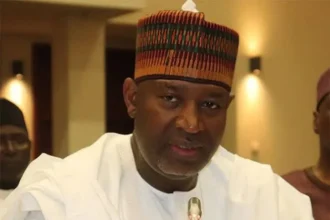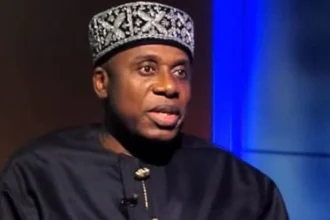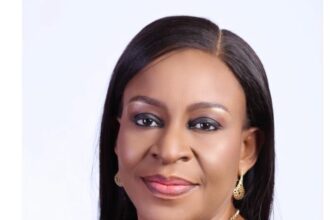...To get all news updates, Join our WhatsApp Group (Click Here)
Also Join our WhatsApp Channel (Click Here)
Just last week, I reviewed most of the pictures from the Muhammadu Buhari campaign before the March 2015 presidential election that I culled from the newspapers. From my observation, the sitting arrangement was a big surprise. It is as if as at then, those who arranged how the key individuals in the campaign sat had envisaged the eventual ranking. In most of the pictures, Buhari was ensconced between his deputy, Prof. Yemi Osinbajo and then Senator Bukola Saraki.
As fate will have it, the three men are now occupying the top three positions in the land. Those pictures made me to do a flashback into how Saraki emerged as Senate President. It has always been clear to President Buhari that what Saraki wanted in the emerging new government was to be Senate President and the then Presidential Candidate, seeing the commitment of the man morally, intellectually, physically and financially, was not opposed to it. In fact, both men worked together closely.
This was the situation until some forces who had an agenda to control the National Assembly as a devise to constitute a constant check to the Buhari Government identified Saraki as a threat to their design. They then covertly went to the President and poisoned his mind against Saraki. That was when the claim of being “too ambitious”, “will use the legislature against you” and “he cannot be trusted with such a powerful position” came.
They then encouraged the President to support a candidate who they presented as the party’s candidate. What those power mongers hid from Buhari was their own plan to hold the National Assembly as a means to always checkmate the President. However, even though they succeeded in making the President withdraw his plan to openly endorse Saraki for the Senate Presidency, Buhari chose not to join the fray in a bid to stop him. Rather, he announced his preparation to work with whoever emerged.
However, Saraki created his own coalition to emerge as Senate President. When Saraki upon becoming Senate President refused to accept the list sent to him by the APC National Working Committee, he incurred Buhari’s wrath. The President felt it was an overkill and that the Senate President wanted to do a winner takes all.
The same anti-Buhari group masquerading as his acolytes told Buhari to allow them teach the recalcitrant Senate President a lesson he would not forget. And that was how the Code of Conduct (CCT) and the forgery of Senate rule book trials commenced in September 2015.
The forgery case has since collapsed as the initiator saw that it lacked substance. The CCT case is still wobbling there with its prosecutor fumbling along. The asset declaration case appeared not well investigated and inelegantly drafted. Even the evidence produced by the prosecution has been debunked and made empty by their own witnesses under cross-examination.
Buhari realized the antics of his ‘new friends’, when they moved against the President on the Kogi and Ondo governorship polls. At that time, the friends refused to toe the party position. Rather, they were ready to destroy the party structure to ensure they get their own candidates in. Their anti-party activities in aid of the candidates of the opposition made Buhari to have a re-think on these type of ‘friends’.
Actually, these ‘friends’ had planned to move alongside their loyalist incumbent Governors with their supporters into another party and fight the President. Their plan was foiled when Saraki aligned with the President and mobilized men and materials to ensure their defeat and the victory of APC candidates in the two elections.
After their failure in both Kogi and Ondo States, the group shifted attention to the party and plotted to get Chief John Odigie-Oyegun, the party’s national chairman, out of the national secretariat. However, the President stood by the party chairman. In defending Oyegun, Buhari enjoyed the support of Saraki. All these defeats and the cold shoulder the ‘friends’ now get from Buhari made them uncomfortable. They quickly beat a retreat and started plotting on how to win the President’s confidence all over again.
In what appeared to be a show of support for Saraki, he and the President began to see very regularly. They share same thoughts on key national issues and presented a common front. This renewed partnership between the President and the Senate President led to the appointment of Saraki’s protege, Mallam Bolaji Abdullahi, a former Minister of Youth and Sports as the National Publicity Secretary of the party. Today, Abdullahi is one of the young Turks providing cover for Oyegun who continues to enjoy the President’s support.
Another indication of the closeness between Buhari and Saraki is evidenced in the turn of events in the relationship between the President and Governor of Kaduna State, Mallam Nasir El-Rufai. During the period the President was in London attending to his health, a memo El-Rufai wrote to him several months before became public. The private memo was a damning report on the general situation of things in the government and as it concerns key members of the administration.
Close watchers of government believed the private memo became public because somebody miscalculated that the President might not survive the illness and was therefore eager to remove himself from what the blame that may result from the perceived failure of the government. An African proverb says ‘let us feign death so that we can know those who will genuinely mourn us when we eventually depart’.
However, in the case of Saraki, he led the National Assembly’s three man delegation to London to see the President. At another occasion, he privately saw the President and informed the nation that there was no cause for panic. His statement after the visit contributed in calming down the tension and apprehension over Buhari’s ill-health. Saraki further briefed his colleagues that the President was okay and would soon return home. His message averted the plan by some hawks in the Senate who wanted the President’s health and prolonged absence from the country debated on the floor.
Since Buhari’s return to the country, Saraki has been a frequent visitor to the Presidential Villa without making any noise. On such occasion, he and the President exchanged ideas and Buhari gets briefed on issues in and around the work of the legislature. On many occasions, Saraki served as sounding board to the President on some executive policies and initiatives which if implemented the way it was initially conceived would have led to public outcry or have a backlash.
As Senate President, Saraki has led his colleagues to confirm the nominees of the President, even when some of the lawmakers have objections. These nominees include ministers, ambassadors, heads of parastatals and many others.
However, it is obvious that those who feel they have something to lose when it becomes obvious that Saraki and Buhari are getting on fine have continued to invest so much resources and efforts in propaganda stuff to create tension between some members of the executive and the legislature while presenting it as if there is a rift between the President and the Senate President.
It should be restated that it is in the interest of Nigeria if these two leaders, against all odds, maintain their good relationship and co-operate to deliver the good times that their party, APC, promised Nigerians, irrespective of the intrigues spawn by the power mongers around them.
Leadership NG
You can get every of our news as soon as they drop on WhatsApp ...To get all news updates, Join our WhatsApp Group (Click Here)
Also Join our WhatsApp Channel (Click Here)









